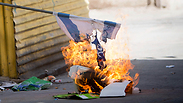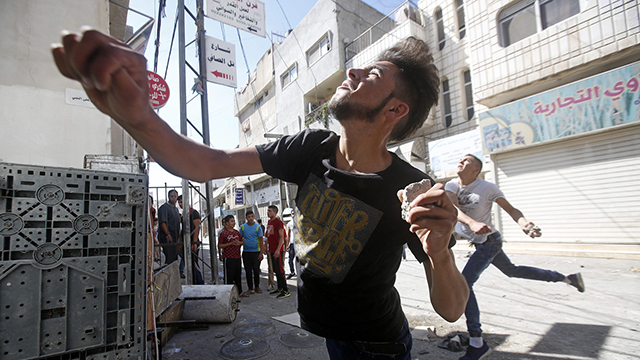
Fuelling the flames in Hebron
Op-ed: When observing the conflict through Hebron—and that's what's happening in the international community—Israel's haters register more and more successes. The chance of changing the cursed status quo in the city is close to zero.
Hebron, the City of the Patriarchs, is an open, bleeding wound. Israel has been hit by ten measures of criticism, nine of which—in days when there isn't a confrontation with Hamas—hit Hebron. It doesn't matter that some of the "incidents" between the Jewish and Palestinian residents of the city are staged. It doesn't matter that some of the houses in the city are under Jewish ownership, both old and new, and completely legal. What's important is that Hebron has become the center of clashes in the territories.
Like a magnet, Hebron draws to it all of the "rights activists" from Israel and abroad who want to prove that Israel is an apartheid state. They don't go to Jenin or Jericho; there are no incidents there. And even if there are, they're mostly of Palestinians clashing with other Palestinians. The activists are not interested in that. They're looking for proof of Israel's crimes.
But only a blind person won't be able to see that there is a problem. With 97 percent Palestinians, and three percent Jews—the situation in Hebron is depressing. No amount of Israeli "hasbara" (public relations) can justify what happens in this city, and the state of affairs there make it clear there is no chance of coexistence. And it's not just because all of the Jews in the city act like barbarians, while all of the Palestinians there are victims. There's no chance for coexistence because such a thing doesn't exist where hostile populations live cheek by jowl.
There is no occupation in Sweden and no conflict. The Muslims were welcomed, and despite that the country is facing very serious problems. When the imam of Malmö sought to open a Muslim academy that would fight against radicalization, the lovely residents of the city didn't want to rent him a place. They're afraid. He had to open his academy on the outskirts of the Rosengård district, which is mostly Muslim in nature. According to a report by the Swedish police, 55 neighborhoods across the country have become no-go zones, problematic areas. This is happening in other cities in Europe as well.
But what's happening in Europe doesn't justify what's happening in Hebron, because in Malmö, for example, there is a joint effort by the authorities and activists in the Muslim community in the fight against violence and radicalization. In Hebron, the situation is the complete opposite: The majority of the Palestinian residents of the city support Hamas. The chances of cooperation or integration are somewhere around zero percent.
Based on that, should Israel increase the friction between the two populations? The answer is obvious. I know some of the Jews that live in Hebron. Many of them renounce violence—it doesn't help them, only puts them at risk. They want to achieve tolerable coexistence. The chance of that, as already mentioned, is none.
But the problem is not just the Jewish residents of Hebron, it's also the Israeli government. It allows itself to be dragged after the extremists. Now, it is considering granting a permit to build another Jewish neighborhood in Hebron. The government, it appears, has decided to exacerbate the problem. It is providing ammunition to Israel's enemies.
Jewish history is closely linked to the city of Hebron, but in the situation created over the past few decades, when observing the conflict through Hebron—and that's what's happening in the international community—Israel's haters register more and more successes. The chance of changing the cursed status quo in the city is close to zero.
It's also safe to assume the prime minister understands that there is a problem. After all, he himself has been dictating a policy of almost zero public construction in most areas of Judea and Samaria.
The settlers complain—likely with good reason—about the construction freeze. This means even the current right-wing government is trying to minimize the damage. That is, up until the moment the pressure increases from the ardent followers of the "Greater Israel" school of thought. It is then that the government caves in. It just can't take the pressure.
The Jewish settlement in Hebron is constantly shooting itself in the foot. It looks like another such incident is brewing, a particularly big one.











